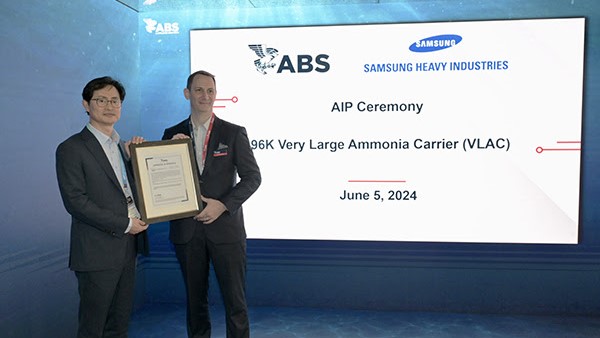ABS awarded approval in principle (AIP) to Samsung Heavy Industries Co., Ltd. (SHI) for its design of a midship section and cargo tank for a 96K very large ammonia carrier. Representatives from both companies met at Posidonia 2024 for the AIP presentation.
Among the largest in the world, the ammonia carrier design is the result of a joint development project that included the production of a 3D structural cargo hold model from SHI for review by ABS.
ABS completed structural analysis and design reviews based on class and statutory requirements.
“The utilization of ammonia is anticipated to increase as industries move toward more sustainable energy sources, and shipping will have a critical role to play. By working with innovative clients like SHI on new carrier designs, ABS is playing an important part in the energy transition by supporting the safe and efficient transport of ammonia at sea,” said Vassilios Kroustallis, ABS Senior Vice President, Global Business Development.
“The development of the ammonia carrier is a significant step towards realizing our vision for a sustainable future. We will continue to pursue innovation to accelerate the advent of a carbon-free era and set the standard for future energy transportation,” said Heaki Jang, Executive Vice President and CTO of Samsung Heavy Industries.
ABS is the world’s premier classification society for gas carriers with more than 50 years of experience building and classing gas carriers of every type and size.
Source: ABS.
Tags: 3D Cargo, ABS, AiP, Samsung



Recent Posts
FRV Partners with Envision Energy on Green Ammonia Project in Brazil
Hamburg Trials HVO 100 Biofuel for Port Fleet as Interim Decarbonization Measure
CUMTA considers water metro linking ECR and Napier bridge
BSM unveils methanol bunkering simulator to equip seafarers for greener shipping
DPA commissions India’s first Make-In-India green hydrogen plant at Kandla
Port of Tauranga to Trial New Zealand’s First Fully Electric Straddle Carrier
OceanScore Crosses 2,300-Vessel Mark as Demand for Compliance Solutions Grows
HD Hyundai and H-Line Shipping Collaborate on AI-Powered Autonomous and Eco-Friendly Vessel Technologies